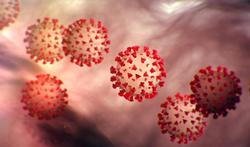UC San Diego's wastewater screening program has detected 85% of COVID-19 cases on the university campus early. This makes it possible to test early, so that contact tracing and quarantine or isolation can also be started quickly.
People infected with SARS-CoV-2, the virus that causes COVID-19, can excrete the virus in their stool even if they have no symptoms. Researchers at the UCSD School of Medicine have been screening the wastewater from campus buildings for signs of the virus since the summer of 2020, because they think the information can help prevent outbreaks.
Even a single infected, asymptomatic person who lives or works in a large building can be detected, the researchers report. Informing the occupants of each building with positive wastewater increased the number of COVID-19 tests to 13 times. Once a resident tested positive, isolation and contact tracing helped prevent further spread of the virus.
"University campuses particularly benefit from wastewater monitoring as a means of preventing COVID-19 outbreaks, as they are full of largely asymptomatic populations and are potential hot spots for transmission that require frequent diagnostic tests," said Smruthi Karthikeyan, an environmental engineer and postdoctoral researcher at the UCSD School of Medicine. Karthikeyan led the study with Rob Knight, professor and director of the Center for Microbiome Innovation at UCSD.
How does the detection system work?
Each morning, a team of students and staff drives golf carts across campus to collect sewage samples from 126 collection robots set up to monitor 350 buildings. Afterwards, Karthikeyan and his team use a different kind of robot in a lab to process the samples. In the event of a positive result, messages are automatically sent to people who regularly visit the building, such as students and staff, with the recommendation that they be tested for the virus as soon as possible.
In five hours, the robot can analyze 96 samples, with a processing cost of up to 13 dollars per sample. The next step, Knight said, is to deploy rapid methods to test in real time for SARS-CoV-2 variants, including Delta.
"We are now helping other campuses and organizations to set up a similar detection system, which has potential not only for COVID-19, but in the future also for many other feces-borne pathogens, including flu,"Knight said.
Sources:ASM Journals
NBC San Diedo
UC San Diego news center




